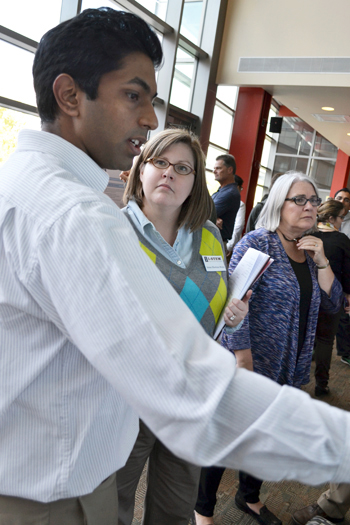
Clockwise from left: CEE grad student Jeevaka Somaratna explains CEE 398 to Ann Horton-Weis and Lizanne DeStefano of I-STEM.
SIIP: Reforming Undergraduate Engineering to Engage Students
October 29, 2013
The goal of SIIP (the Strategic Instructional Initiatives Program) is to reform Engineering's core undergraduate courses to engage students and improve learning. How? By changing the way the courses are taught, then checking with students to see if it's been effective. Is it working? Based on feedback from educators at SIIP's recent Poster Showcase on Friday October 18, it appears to be.
One important aspect of SIIP is to improve pedagogy—the way courses are taught. For some of the targeted courses SIIP projects address, this involves project-based learning. For example, CEE 398 PBL is offering a sustainability course with a twist: students' projects must address campus problems. So one team's project is taking on two things that sometimes stink on campus: the swine manure (on south campus)…and the roads. They're working on converting manure to oil that can be used on local roads, a win-win solution that would benefit both the south farms and campus infrastructure.
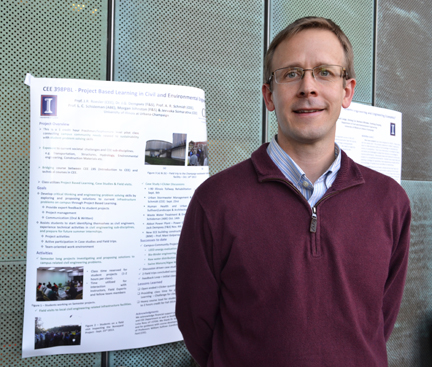
Professor Jeff Roesler, one of the instructors of CEE 398 PBL.
"So we get rid of waste and actually use it for something useful," acknowledges Jeff Roesler, one of the course instructors.
In addition to the class projects, the course employs case studies which give students the opportunity to tackle real-world problems. And for one case study, the class had to look no farther than their own backyard: Boneyard Creek. Though a perennial thorn in engineering campus' backside, it is providing this crop of new civil engineers hands-on experience in how to address the problem of storm water management in an urban setting.
The goal of exposing students to all these practical, real-world problems? To get students to think like engineers:
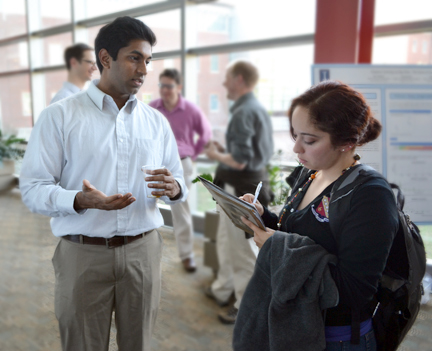
Jeevaka Somaratna explains CEE 398 PBL to I-STEM undergrad Katie Villagomez-Guzman during the SIIP Poster Showcase.
"Part of being an engineer," explains Roesler, "is thinking critically and organizing thoughts and how I'm gonna' do things. And that part has to be learned over time. So we're introducing that earlier on."
ME370 employs hands-on learning. For example, the final project is designing and building a dart-throwing mechanism, with an added incentive to spice it up: a competition to see whose machine is the most precise when aiming darts at a bulls-eye. But according to Assistant Professor Sameh Tawfick, they've encountered a bit of a dilemma, which those of us who are very competitive might not find unreasonable: "Some students, who are very competitive, wanted to hide their designs from other teams." However, they've discouraged this, trying to foster a spirit of teamwork and collaboration.
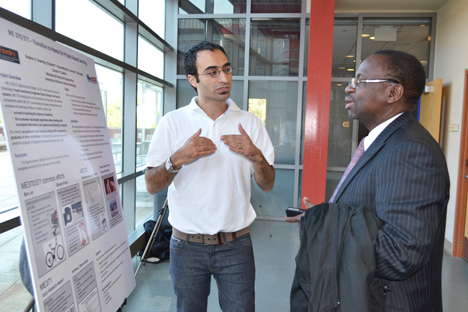
Sameh Tawfick explains the particulars of ME 370 and 371 to Illinois Provost Ilesanmi Adesida.
Another aspect of hands-on learning they've incorporated actually encourages students to get their hands dirty.
"Many students have bikes," says Tawfick, "but they never try to understand how the bike's chain shifts from one gear to another exactly. Now they know…this is something that they've studied…They've done some analysis on it. They've done the analysis, not just on paper, but hands-on; they took some measurements; they got grease on their hands, and this is how you become a real mechanical engineer."
Another tool many SIIP courses are using to improve pedagogy? Technology. For instance, many SIIP teams are developing interactive, web-based tools or using multi-media, such as online pre-lectures.
In introductory Physics courses, students are given a choice between using animated multimedia solutions or conventional, static solutions when doing practice exam problems. The impact? On the real exam, students who had used the animated multimedia solutions performed better.
CEE 202 is being redesigned to include a variety of technological learning tools: pre-lecture videos with checkpoint questions; a Graphic User Interface which enables students to have an interactive learning experience; and online assignments via Compass2G.
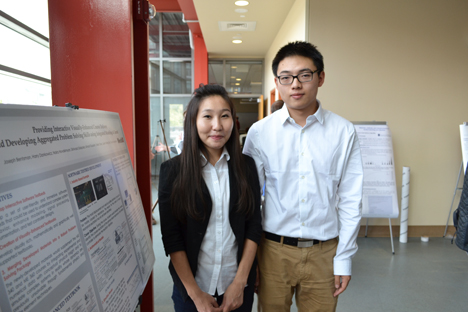
Zhelin Chen and Oyuna Angatkina, members of MechSE's SIIP team working to incorporate interactive, visually enhanced course delivery via ME 340 and ME 360.
To improve ME 340 & 360, the MechSE SIIP team has developed interactive simulations and a visually-enhanced textbook which is regularly updated based on student feedback.
The Computer Science team of professors is using technology to help them identify struggling students early on. To help students learn key concepts/skills, they've developed a fun, interactive way to expose students to programming challenges. Another online tool allows students to request help from TAs.
Also employing technology, a team of ECE faculty is providing students access to teaching materials, such as video lectures, self-guided laboratory exercises, and practice online exams. Not only that, but they are developing technologies to help with student assessment and to provide students in large classes with direct, valuable, meaningful feedback.
In addition to increasing the use of technology, the ECE team has embraced an ambitious undertaking—to create the best core computer engineering sequence in the world…no small task.
Based on curriculum committee discussions, ECE professors Steven Lumetta and Douglas Jones had come to the conclusion that it was time to revamp ECE's core of Computer Engineering courses. "It had been quite a while since some of our classes had been overhauled. We always evolved them, so things changed slowly over time."
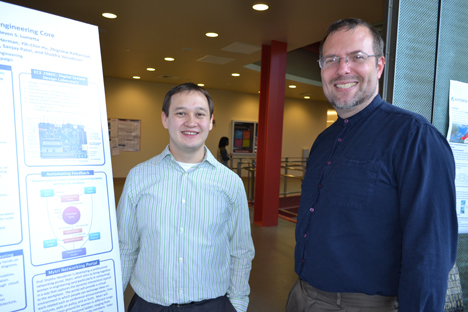
Geoffrey Herman and Steven Lumetta, members of the SIIP team working to restructure the ECE computing core of courses.
At the same time, engineering pedagogy experts Michael Louis and Geoffrey Herman arrived at the same conclusion. So the two pairs merged to form the core team which tackled the Herculean task of overhauling the ECE curriculum. For example, in addition to changing the sequence, they flipped two classes around and moved some material between classes.
"That kind of change," confides Lumetta, "takes a fair bit of coordinated effort among faculty."
SIIP Advisory Board member Geoffrey Herman, a Visiting Assistant Professor in iFoundry, whose background is in education research, is primarily focused on motivation: "How do we change students' motivational orientations from extrinsic, like, 'What do I need to get a grade?' to 'How do I learn material because it's interesting in and of itself?'" Herman says his role in SIIP projects is to make engineering fun again. "How do we get our students to become more interested in learning because it's interesting, and because it's fun, and because it's enjoyable? That's one of the main missions of iFoundry, is to bring back the joy of engineering."
To find out if the changes SIIP has fostered have been effective, most SIIP teams are assessing student involvement via learning analytics...or checking with the students themselves.Most use I-STEM-run student focus groups to get in-depth feedback; then, based on the results, they develop pedagogy to improve their courses.
Since one of the main emphases of SIIP is to increase student engagement, does it appear to be working? Tawfick thinks so, based on informal feedback he's gotten from students. He reports that students got so excited during the bike lab, that "Some of them literally said, 'This is the best exercise we've done since we joined the Mechanical Engineering Department.'"
He also cites this as added proof: students come back at night to take advantage of an extra lab session: "Some voluntarily come in the evening. Students want to come, because they want to have more access to the machines in the evening, so they can touch everything and use everything themselves."
Another important real-world skill many SIIP courses are trying to foster in students is the ability to collaborate—to work on a team—which has gotten mixed reactions from students. Tawfick says his students periodically balk at group work. "Some students are worried it will affect their A," he admits. However, graduate student Aaron Anderson, who works with the SIIP project that is overhauling a number of TAM (Theoretical and Applied Mechanics) courses, thinks this emphasis adds to student engagement:
"They seem much more engaged," says Anderson, "especially in these group settings, where they're doing a group worksheet and discussions. Previously, discussion sections were just: a TA would go to the board and work through some problems, and they were very passive. Whereas now, they're forced to be in groups, work with other students, like they would in a job or a project setting somewhere else…They seem much more interested in asking questions, and it builds engagement."
Herman's assessment? "I think we still have a lot of room to grow in terms of creating a classroom experience that fully engages the students the way we'd ultimately want to be able to do, but we're on the right track, and I think we're making good progress."
Story and photographs by Elizabeth Innes, Communications Specialist, I-STEM Education Initiative.
More: Engineering, Undergrad Education Reform, 2013
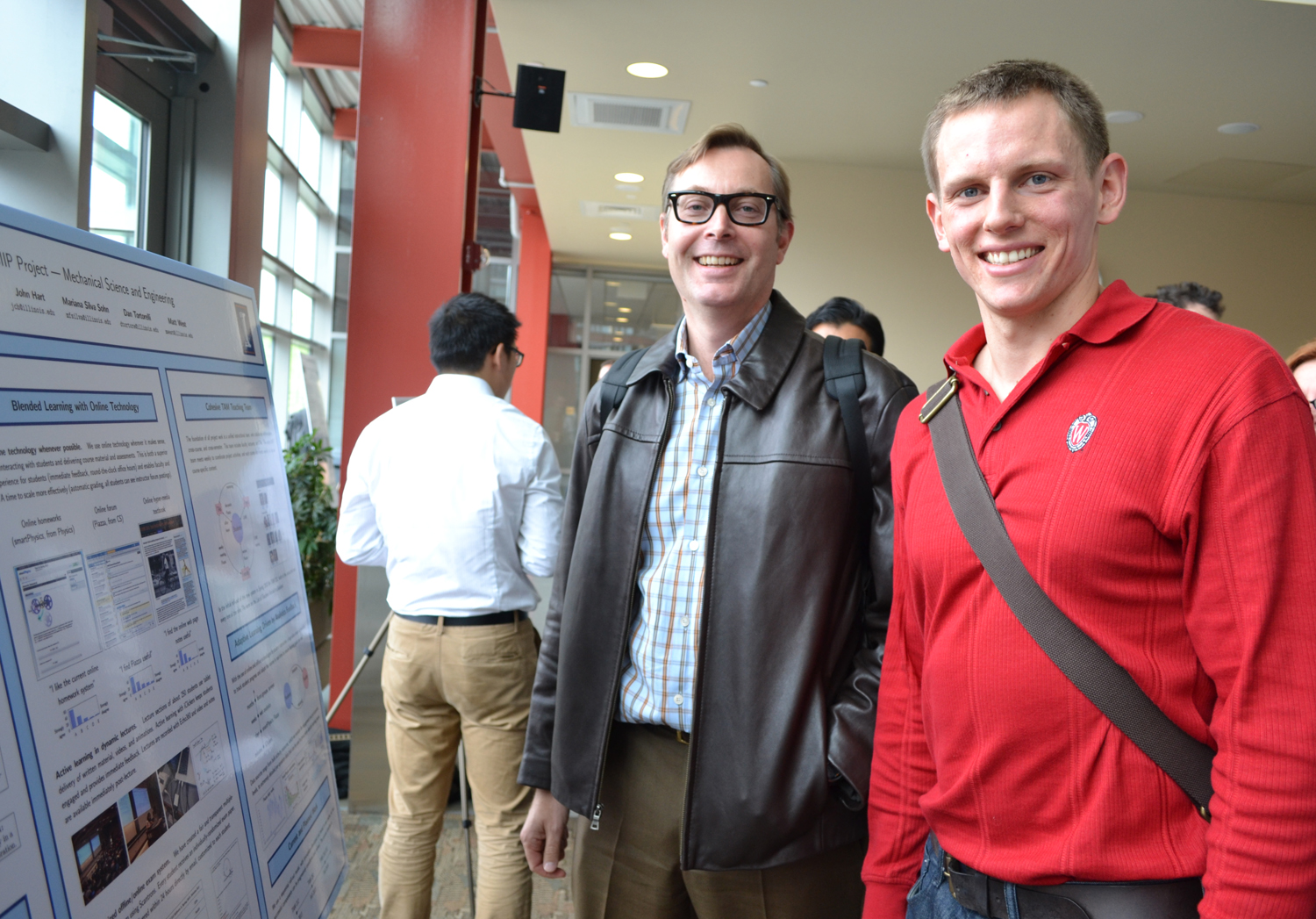
MechSE Professor Geir Dullerud and grad student Aaron Anderson from the TAM SIIP team.













.jpg)
















